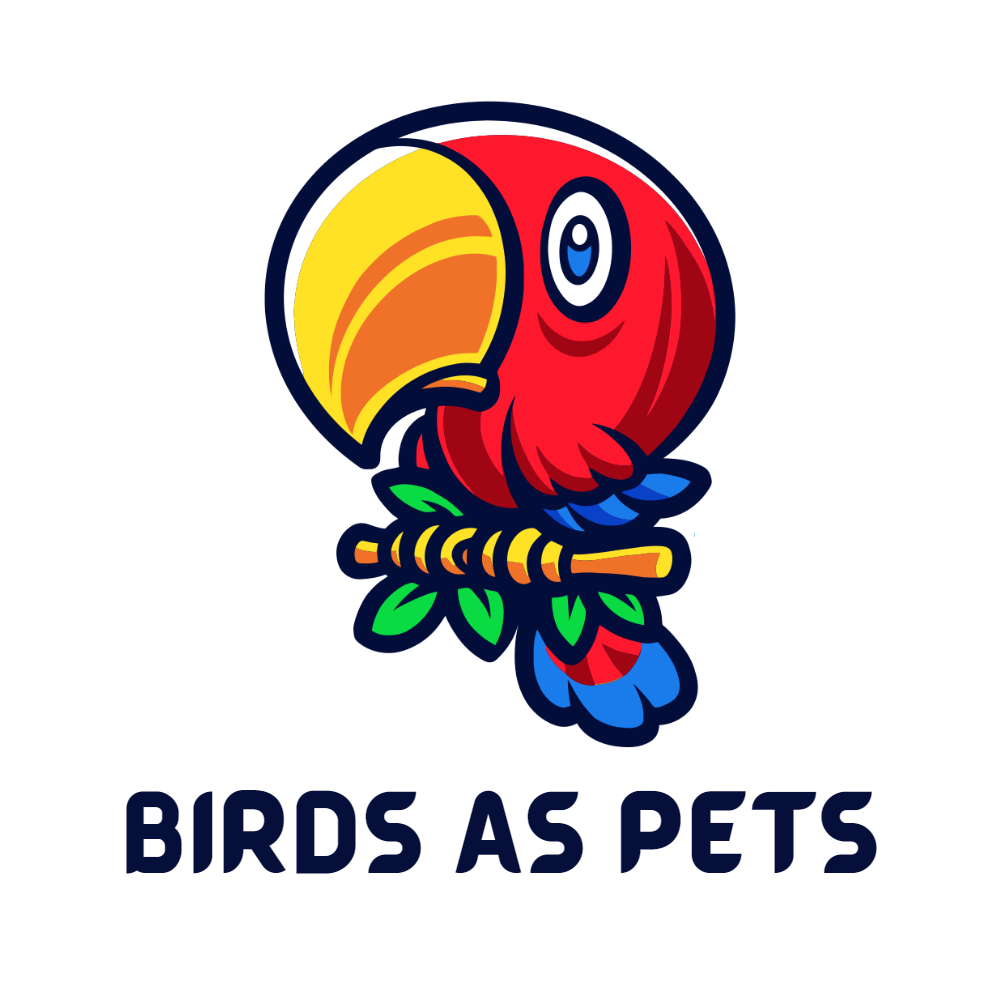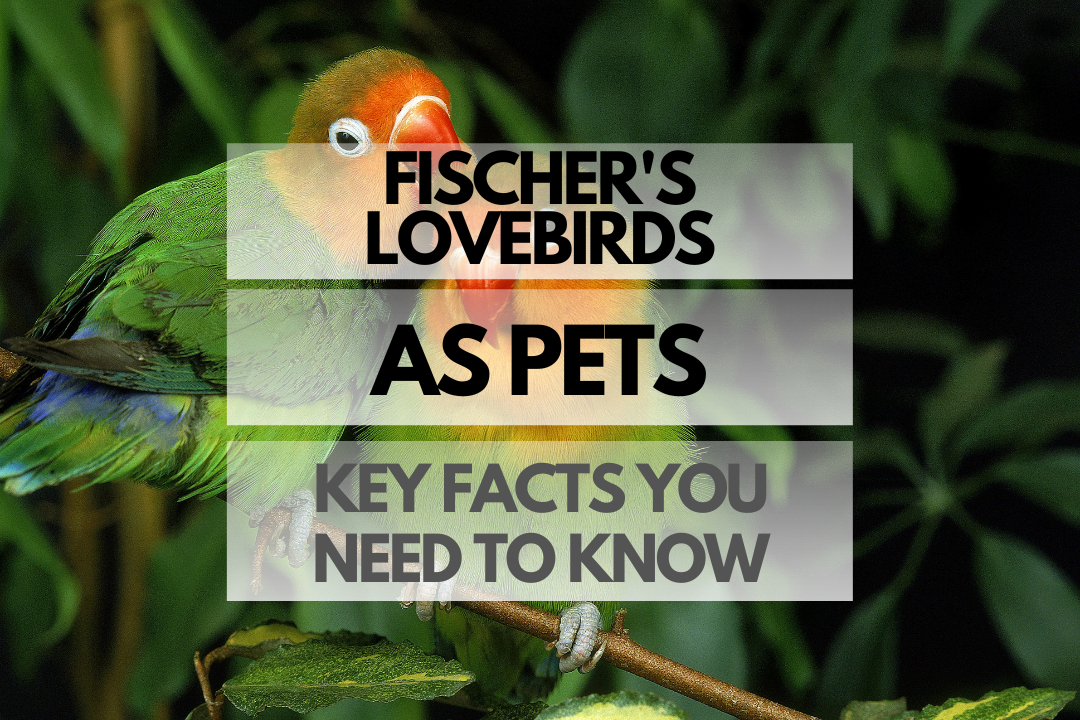Fischer’s Lovebirds are small, colorful, and energetic parrots that can make delightful pets for the right owner. In this article, we’ll dive into the world of these charming birds and explore what you need to know before bringing one home as a pet.
Quick Reference Table: Fischer’s Lovebirds Facts
| Fact | Description |
|---|---|
| Scientific Name | Agapornis fischeri |
| Size | 5-6 inches (12-15 cm) |
| Weight | 1.5-2 ounces (40-60 grams) |
| Lifespan | 10-15 years |
| Colors | Green, orange, blue, and white |
| Noise Level | Moderate |
| Talking Ability | Limited |
Where Do Wild Fischer’s Lovebirds Live?
Wild Fischer’s Lovebirds are native to a small region of eastern Africa, primarily in Tanzania. They inhabit savannah woodlands, grasslands, and areas near bodies of water. In their natural habitat, they live in social flocks and are known for their strong pair bonds.
Fischer’s Lovebirds Lifespan: How Long Do They Live as Pets?
Fischer’s Lovebirds can live for 10-15 years or even longer with proper care. As a potential owner, it’s important to consider the time commitment involved in caring for a bird with such a long lifespan. Regular veterinary check-ups, a balanced diet, and proper housing are essential to ensure a long, healthy life for your pet.
Are Fischer’s Lovebirds Good Pets?
Yes, Fischer’s Lovebirds can make excellent pets for the right owner. They are known for their affectionate and playful personalities, as well as their striking colors. These social birds form strong bonds with their owners and enjoy spending time interacting with them. However, they can be territorial and may not be suitable for households with other birds or small children.
Are Fischer’s Lovebirds as Pets Good for Beginners?
Fischer’s Lovebirds can be a good choice for beginners, as their care requirements are relatively straightforward. However, potential owners should be prepared for their social nature and be willing to provide regular interaction and mental stimulation. First-time bird owners should also be prepared to learn about proper diet, housing, and care for these small parrots.
Are Fischer’s Lovebirds Easy to Care For?
While their care requirements are not overly complex, Fischer’s Lovebirds do require regular attention, a proper diet, and suitable housing. Like all parrots, they need toys and activities to keep them mentally stimulated and prevent boredom. Overall, their care is manageable but requires commitment and consistency.
Fischer’s Lovebirds Pros and Cons
| Pros | Cons |
|---|---|
| Affectionate and social | Can be territorial |
| Attractive colors | Moderate noise level |
| Relatively easy care | Not great talkers |
| Good for beginners | Long lifespan – time commitment |
Fischer’s Lovebirds Price and Costs
The price for a Fischer’s Lovebird can range from $100 to $200, depending on factors such as age, color, and availability. Initial setup costs for a suitable cage, toys, and accessories can range from $200 to $500. Ongoing expenses include food, toys, and veterinary care, which can vary depending on individual needs and preferences.
Where to Buy Fischer’s Lovebirds
Fischer’s Lovebirds canbe purchased from reputable breeders, pet stores, or bird rescue organizations. It’s essential to research and choose a trustworthy source to ensure you’re getting a healthy, well-socialized bird.
Caring for Fischer’s Lovebirds
Fischer’s Lovebirds Food
A balanced diet for Fischer’s Lovebirds should include a high-quality pellet, fresh fruits, vegetables, and occasional treats like nuts and seeds. It’s important to avoid feeding them avocado, chocolate, caffeine, and alcohol, as these can be toxic to birds.
Health and Common Issues
Common health issues for Fischer’s Lovebirds include feather plucking, respiratory infections, and egg-binding in females. Regular veterinary check-ups, a clean environment, and proper nutrition can help prevent many health issues.
Signs of Healthy Fischer’s Lovebirds
| Healthy | Sick |
|---|---|
| Bright, alert, and active | Lethargic, unresponsive |
| Clear, bright eyes | Discharge, cloudy or swollen eyes |
| Smooth, well-groomed feathers | Ruffled, plucked, or dirty feathers |
| Regular eating and drinking | Loss of appetite, weight loss |
| Normal droppings | Diarrhea, discolored or abnormal droppings |
Fischer’s Lovebirds Pet Insurance
While pet insurance for birds is less common than for cats and dogs, it is available and can help cover the cost of veterinary care for your Fischer’s Lovebird. Some insurance providers offer coverage specifically tailored to exotic pets, including birds. Before purchasing pet insurance, research different providers and their coverage options to find the best fit for your needs and budget.
Personality and Behavior
Fischer’s Lovebirds are known for their affectionate, playful, and curious personalities. They enjoy exploring their environment and interacting with their human caregivers. These birds are also quite intelligent and can learn to perform tricks and solve puzzles. However, they can be territorial and may become aggressive if they feel threatened or if their space is invaded.
Are Fischer’s Lovebirds Social?
Yes, Fischer’s Lovebirds are highly social animals that thrive on interaction and companionship. In the wild, they live in flocks and form strong pair bonds. As pets, they can form a deep attachment to their human caregivers and enjoy spending time with them. It’s important to provide regular social interaction and mental stimulation to keep your lovebird happy and healthy.
Speech and Noise of Fischer’s Lovebirds
Fischer’s Lovebirds are not known for their talking ability, and their speech is generally limited to mimicking a few simple words or sounds. However, they are moderately noisy birds that can produce various chirps, whistles, and squawks. While their noise level may not be overwhelming, it can be a factor to consider, especially if you live in an apartment or have noise-sensitive neighbors.
Similar Species to Fischer’s Lovebirds
Several species of lovebirds share similar characteristics with Fischer’s Lovebirds, including:
- Masked Lovebirds (Agapornis personatus)
- Peach-faced Lovebirds (Agapornis roseicollis)
- Black-cheeked Lovebirds (Agapornis nigrigenis)
- Nyasa Lovebirds (Agapornis lilianae)
While these species may look similar, it’s important to research their individual care requirements and behaviors, as there may be differences that affect their suitability as pets.
Can Fischer’s Lovebirds Live With Other Pets and Birds?
Fischer’s Lovebirds can be territorial and may not get along well with other birds, particularly other lovebirds or parrots. Introducing them to other pets should be done cautiously and under supervision. They may be more compatible with small, non-aggressive bird species, but it’s crucial to monitor their interactions and separate them if conflicts arise.
Are Fischer’s Lovebirds Legal to Have as Pets?
In most locations, Fischer’s Lovebirds are legal to own as pets. However, local regulations may vary, so it’s important to check your specific area’s laws and requirements before acquiring a Fischer’s Lovebird. Additionally, some areas may require permits or have restrictions on the sale and transport of exotic birds.
Additional Resources
- Books: “Lovebirds: Owners Manual and Reference Guide” by Dirk van den Abeele
- Forums: Avian Avenue Parrot Forum (https://www.avianavenue.com/)
- Facebook Groups: Lovebird Lovers (https://www.facebook.com/groups/lovebirdlovers/)
- Scientific Article: “Review of the housing and care of captive lovebirds” by J. B. Williams (https://www.sciencedirect.com/science/article/pii/S0034528819307523)
FAQ for Fischer’s Lovebirds as Pets
Do Fischer’s Lovebirds talk?
While Fischer’s Lovebirds can mimic a few simple words or sounds, they are not known for their talking ability. Their vocalizations mainly consist of chirps, whistles, and squawks.
Are Fischer’s Lovebirds suitable for families with young kids?
Fischer’s Lovebirds can make good family pets, but they may not be suitable for households with very young children, as they can be territorial and may nip if they feel threatened. Supervision is recommended during interactions between children and lovebirdsto ensure everyone’s safety.
Can Fischer’s Lovebirds be trained?
Yes, Fischer’s Lovebirds are intelligent birds that can be trained to perform tricks and respond to commands. With patience, positive reinforcement, and consistency, you can teach your lovebird various behaviors and even some simple games.
How do I know what gender Fischer’s Lovebirds are?
Sexing Fischer’s Lovebirds can be challenging, as males and females have similar appearances. The most reliable way to determine the sex of your lovebird is through DNA testing, which can be done by a veterinarian or using a home DNA testing kit.
What is the lifespan of Fischer’s Lovebirds?
With proper care and nutrition, Fischer’s Lovebirds can live 15-20 years or more. Providing a balanced diet, a clean environment, and regular veterinary check-ups will help ensure your lovebird lives a long and healthy life.
What should I feed my Fischer’s Lovebird?
A balanced diet for Fischer’s Lovebirds should include a high-quality pellet or seed mix specifically formulated for lovebirds, a variety of fresh fruits and vegetables, and occasional treats like nuts or cooked grains. Avoid feeding your lovebird chocolate, avocado, or foods high in salt or sugar, as these can be harmful to their health.

